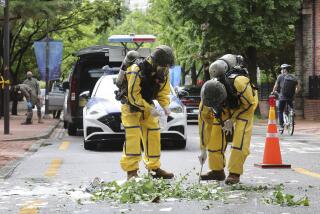Mr. President, Don’t Shake Hands With Kim Jong Il
President Clinton should think twice about visiting North Korea. Sure, he might persuade North Korea’s leader, Kim Jong Il, to sign a ballistic missile treaty. But he’ll also reward him for the deaths of at least 3 million people from an avoidable famine. The remainder of the population has been driven to acts of unspeakable barbarism not seen since Pol Pot’s Cambodia.
I’ve witnessed the horror. Despite the strict controls on foreign journalists, I recently led a British TV documentary team that managed to sneak footage out of North Korea, the most secretive state in the world. Our cameraman, Ahn Chol (a pseudonym), is a North Korean who lost both his parents to the famine and escaped to neighboring China two years ago. Risking execution, he ventured back into North Korea to secretly film what’s really going on there for us. His footage is shocking. Starving children abandoned by the state. Orphans thrown into state asylums and left to die.
Our other cameraman risked his life to film U.S. aid sacks being sold on the North Korean black market, with emaciated children begging for food close by. The labels on the sacks read, “A present from America.”
These aren’t the well-fed tots sent out to parade with Secretary of State Madeleine Albright in Pyongyang in October to assure us that U.S. aid was getting through. There are 200,000 orphans believed to be starving, despite the fact that North Korea receives more food aid per capita than all but one country in the world. “The international aid is being channeled to the military,” Ahn Chol says.
Clinton should know about Jang Gil-Su, a 15-year-old who risked being shot as he escaped to China. He and 14 members of his family are in hiding there, desperate to avoid the Chinese police who return North Korean refugees to face punishment, even death.
Jang’s is a chilling case. Over the last three years, he has drawn and annotated 120 pictures of everyday life in his country. The Center for Saving Gil-Su’s Family, headed by Prof. Dongkyu Kim of Korea University, gave these drawings to me, and they have been published in Seoul in book form. They show families eating anything to survive: pine bark, snakes, rats. A man at a market stall--”Man selling human flesh at a farmers market in Hoeroung city,” writes Jang.
Human flesh? “Saram hoki” (cannibalism), other refugees tell us. All of the North Koreans we interviewed knew about it. Gil-Su’s picture of a dismembered child in a cooking pot says more than any of the numbing statistics. “There are many cases of killing people and eating the flesh,” a refugee told us. “You eat it, without knowing it’s human flesh,” a teenage orphan added. “You’re so hungry, you just eat it.”
The starvation is no accident. North Korea has done nothing to address its food crisis, said Lee Min Bok, a former top North Korean agricultural expert. Natural disasters are blamed, but the regime’s Stalinist agricultural policy is the main culprit. Lee should know; he went to prison in North Korea for proposing reform.
Meanwhile, North Korea is supplying Americans with a quick fix. One farmer told us that he and other farmers were ordered by the state to stop growing food and to grow opium instead. The opium would then be processed by the state into heroin and sold abroad. The proceeds would go to arm the military. This farmer could be killed if he were caught talking to us. “I have to let the world know what’s going on,” he said.
Survivors of North Korea’s prison camps present an even bleaker picture. Eyewitnesses attest to 12 of these camps, with a total population of 200,000. A former prison guard told us that whole families are incarcerated in these camps. Women are sexually abused and tortured. Children are forced to do hard labor in mines. Many children died this way, says Kang Chul-hwan, who was imprisoned when he was 9 years old. Nine! Why? Imprisoning families for something a father, husband or son may have said against the state--however trivial--is how the dictatorship controls dissent. “There hasn’t been a single demonstration in North Korea for the last 50 years,” Kang says. “Who would dare dissent if you know your family will be taken away?”
Despite international reports of these horrors, the Clinton administration is silent on North Korean human rights, tip-toeing around Kim Jong Il. But as the victims of this brutal regime would attest, Kim’s reign has been psychopathic, perverted. Can any democratic leader shake hands with a dictator who imprisons little children and who has driven his people to cannibalism?
Ignoring North Korea’s abominations is an abomination in itself. The pictures do not lie. However Clinton begins to shape his legacy, he must not end it with appeasement. “Three million people have died since Kim Jong Il came to power,” one refugee told us. “It is a war without sound. Because you die of hunger.” Or end up eaten.
More to Read
Sign up for Essential California
The most important California stories and recommendations in your inbox every morning.
You may occasionally receive promotional content from the Los Angeles Times.










